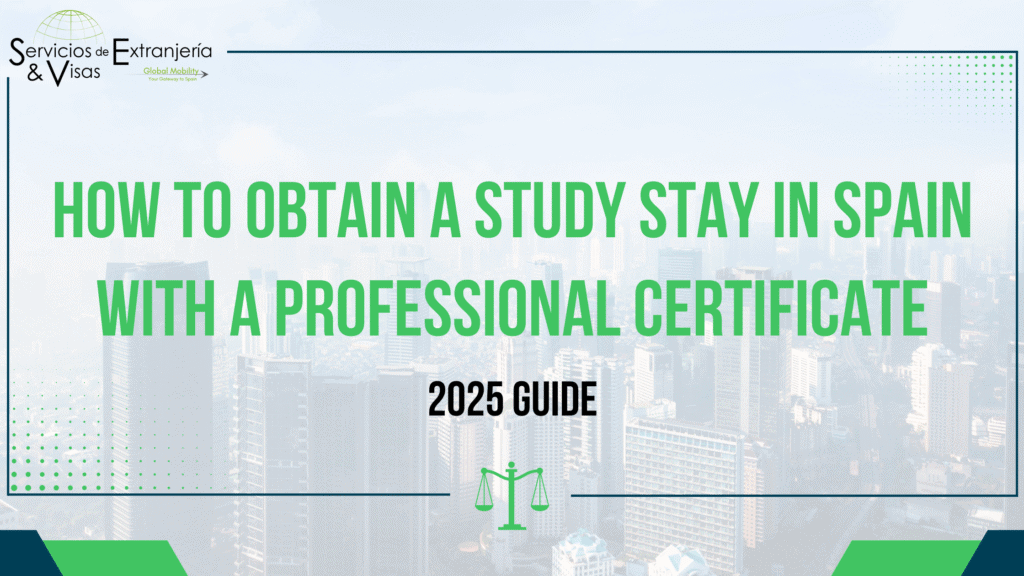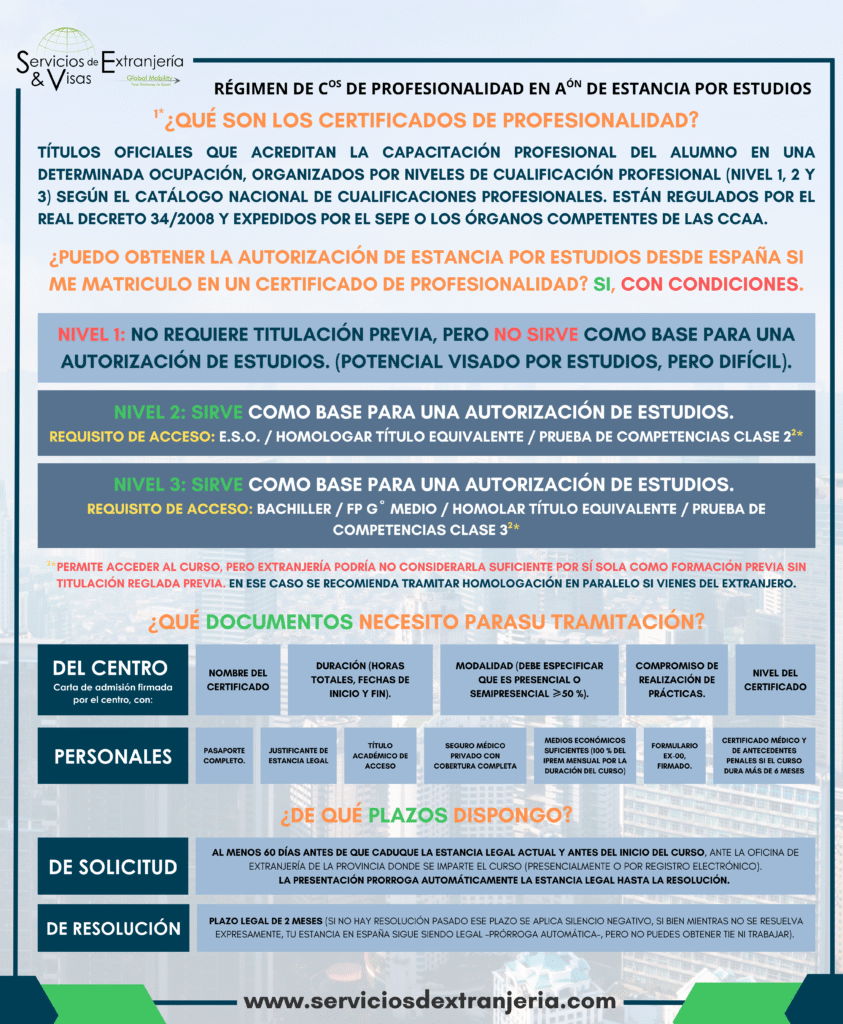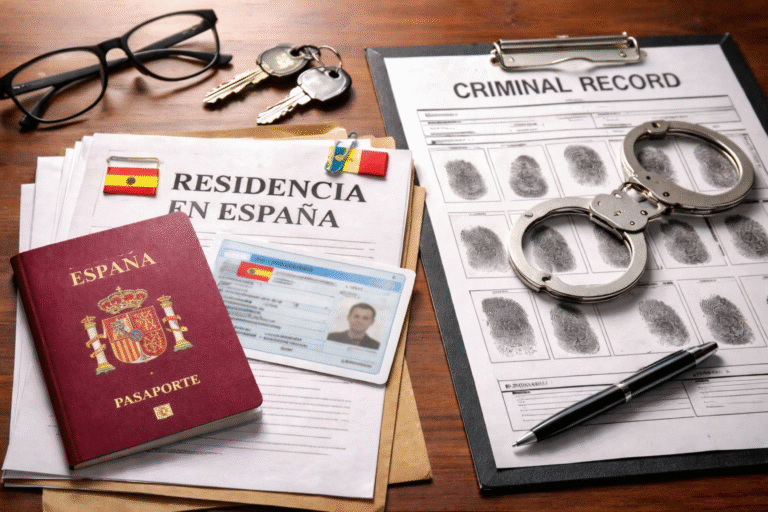How to Obtain a Study Stay in Spain with a Professional Certificate (2025 Guide)

1) What is a study stay authorisation and who can apply for it?
Since the new Immigration Regulations came into force (Royal Decree 1155/2024, effective as of 20 May 2025), non-EU residents in Spain can apply for a study stay authorisation to undertake regulated education, volunteering, mobility programmes or training courses. This permit allows legal residence in Spain for the duration of the approved course. It can be requested from abroad (through the relevant consulate) or from within Spain, even by those already holding a valid residence permit. This is one of the main innovations of the new regulation.
To access this authorisation, applicants must hold a valid passport, have sufficient financial means, medical insurance, and no criminal record. They must also have been admitted to an authorised centre offering a full-time programme leading to an official qualification. Once granted, the permit covers the entire duration of the course, even if it exceeds one year. Moreover, the student may work for an employer up to 30 hours per week without requiring an additional work permit.
In this context, level 2 and 3 Professional Certificates are especially relevant, as they qualify for this authorisation and improve future employability prospects. Let’s take a closer look at the requirements.
2) Which certificate levels are valid and what are the course conditions?
Professional Certificates certify occupational competences in various fields and are classified into levels 1, 2, and 3. However, only levels 2 and 3 are eligible for the study stay authorisation. Article 52.1.e) of the 2025 Immigration Regulation (RLOEX) specifies that only complete level C certificates (as defined in Organic Law 3/2022) at levels 2 or 3 are valid. Level 1 certificates, being basic training without academic entry requirements, are not accepted for this authorisation.
In addition, even valid certificates must meet certain technical conditions:
- Complete course: The entire certificate must be completed, including all theoretical and practical modules (such as occupational risk prevention and the compulsory non-labour work placement).
- Accredited training centre: The course must be delivered by an officially accredited centre, registered in the national or regional training provider registry.
- In-person or blended modality: At least 50% of the course hours must be delivered in person. Fully online certificates are not accepted.
- Full-time schedule: The course must be full-time, generally considered to be a minimum of 20 hours per week.
- Minimum duration: The course must last at least three months (91 days) or around 300 training hours.
Successfully completing one of these certificates allows for a subsequent modification to residence with a work permit, without leaving Spain. It is a fast and legal pathway to enter the job market, which is why it has become a highly valued option among the resident migrant community.
3) Should I also have my previous studies officially recognised?
To access a level 2 or 3 certificate, it is necessary to hold ESO (Compulsory Secondary Education) or Baccalaureate level studies respectively (or equivalent qualifications). Therefore, if your prior studies were completed outside Spain and are not officially recognised, the training centre may require you to take a competency test, adding uncertainty or even risking rejection. Applying for recognition (homologation) in parallel with the study stay application is advisable for several reasons:
- It guarantees access to the certificate without administrative hurdles.
- It offers an alternative route in case the study stay application is rejected.
- It enables access to other regulated studies or regularisation pathways in future, such as “residence permit for vocational training on exceptional grounds”.
Recognition can take several months, so it is best to start the process as early as possible. Moreover, both the recognition procedure and the study stay application require submission of legalised/apostilled documentation with official sworn translations into Spanish. In this respect, we work alongside our partners at En Otras Palabras, specialists in sworn translation of academic documents.
4) What documentation is required, what are the deadlines, and what happens if there is no response?
Both the applicant and, if applicable, the training centre must submit the following documents:
- Official EX-00 form and proof of fee payment.
- Complete and valid passport.
- Admission letter from the training centre, including dates, schedule, and specialisation.
- Proof of course payment or reservation.
- Proof of sufficient financial means: minimum of 100% of the monthly IPREM (~€600 in 2025). For accompanying family members: an additional 75% for the first and 50% for each extra dependant.
- Health insurance valid in Spain (with no co-payments or waiting periods).
- Criminal record certificate and medical certificate if the stay exceeds 6 months.
- Proof of legal stay in Spain, if applying from within the country (residence permit, visa, etc.).
The application must be submitted at least two months before the course starts and before your current stay or residence expires. If submitted within this time frame, the previous legal status is automatically extended until the application is resolved. The Administration has 1 month to decide. If no response is received within that time, the silence is deemed negative (i.e. the application is considered rejected). If rejected either by express resolution or silence, you may file an appeal or reapply with improvements.
Once granted, if the course lasts longer than six months, you must apply for a TIE (Foreigner Identity Card) within 1 month. The study stay is granted for the course duration (up to 12 months for non-higher education). It can be extended if you continue studying—up to a total of 2 years for Professional Certificates. Once the course ends, you may switch to a residence and work permit, provided you meet the legal requirements.
In conclusion…
The new regulatory framework offers new opportunities for non-EU residents in Spain. Level 2 and 3 Professional Certificates not only allow you to maintain legal residence through studies, but also improve your medium-term access to employment.
That said, the process demands attention to detail, strict compliance with requirements, and solid planning of your documentation. At Servicios de Extranjería, we guide you through every step—from selecting the course and centre, to managing the full application, academic recognition, and sworn translations through our partner En Otras Palabras.








